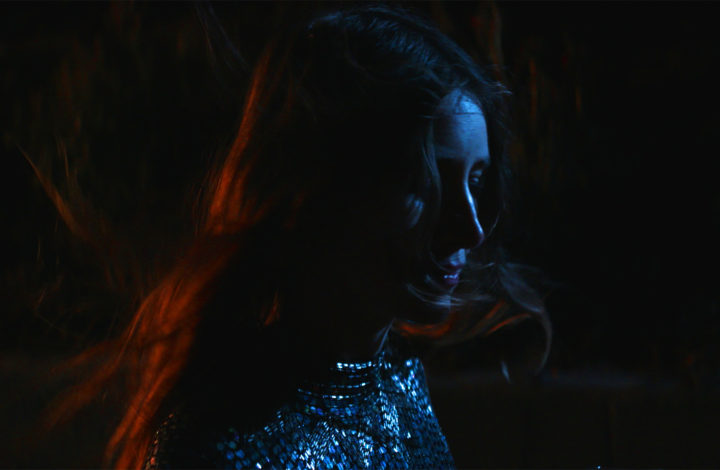
MPAA Rating: R | Rating: ★★★
Release year: 2020
Genre: Thriller, WTF Director: Amy Seimetz
Amy Seimetz’s She Dies Tomorrow is Albert Camus meets David Lynch, a darkly absurdist fable about our fear of mortality and its unsettling capacity to spread. Using jarring editing techniques, an unnerving sound design, and the contrast of shadows and vibrant colors, it’s as if Nicholas Winding Refn had directed a mumblecore film. In this way, the film is resistant to generic categorization—it’s funny, creepy, bizarre, and lackadaisical, all at once—even as it still feels like a “genre film.” Which genre remains unresolved; the experimental film dismantles definitional boundaries.
The concept of fear-as-contagion isn’t necessarily breaking new ground, but Seimetz employs the aforementioned editing and lighting techniques to generate a genuine sense of dread for the viewer through the mise-en-scène and performances. The film begins and ends with Amy (Kate Lyn Sheil), a young woman who appears to be plagued by unspoken anxiety, as if she were in a constant state of shock. We learn through flashbacks that she wasn’t always this way—carefree and charming, even as a recovering addict, she just bought a house for herself and is still in the process of moving in, enjoying her independence. Life is looking up. So the peculiar behavior of this new Amy, the one who looks like she’s either half-asleep or just seen a ghost, gives us clues that something is truly amiss. Yet whatever this dread-inducing force is, it’s entirely interior and subjective. Amy calls her friend Jane (Jane Adams) to come over; she tries to explain that she knows, beyond a doubt, that she will die the following day. She’s not sick, she’s not suicidal; she’s just certain. After their brief encounter, this same crippling existential dread somehow spreads to Jane, who in turn spreads it to others.
What makes She Dies Tomorrow so convincing is the subtly powerful performances from every actor. Seimetz has gathered a great ensemble cast—Chris Messina, Josh Lucas, Michelle Rodriguez, Tunde Adebimpe, Katie Aselton—and each of them communicates an internal emotional fear not through lengthy exposition, but through their posture and facial expressions, most notably their eyes. In the scene where Messina has first caught “it,” strobes of color flash across his face in mysterious expressionistic fashion, while his eyes blink and shift in such an agitated way as to communicate all we need to know: it’s as if he has seen Death itself appear in the room. Indeed, as a formalist exercise, She Dies Tomorrow is more about mood than a message, focusing on the cinematic emotional environment rather than conventional storytelling. In this way, She Dies Tomorrow may be unsatisfying for viewers who want to know how and why this fear is contagious, or need a resolution or direction for the characters’ narrative arcs. Seimetz seems less interested in giving us answers as she is in making us feel how it feels to be overcome by anxiety. In this way, She Dies Tomorrow is an embodiment of its own thematic concerns—it is both about the communal spread of existential dread and it develops such dread within the audience itself. We can catch “it” from watching the film. So proceed with caution: in our current era—a global pandemic, an economic crisis, police brutality, fearmongering and immoral political leadership—perhaps we have all the overwhelming anxiety we can handle.
IMDB Listing: https://www.imdb.com/title/tt11614912/
Leave a Reply